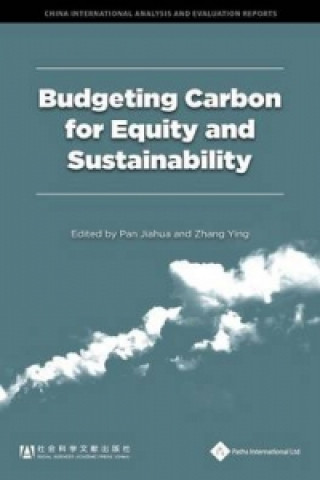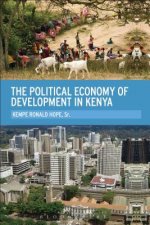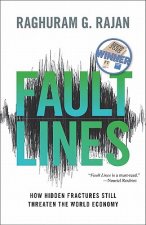
Kód: 01223791
Budgeting Carbon for Equity and Sustainability
Autor Pan Jiahua
Although there is no denial of climate justice, there has been a persistent lack of practical joined-up actions regarding the creation of an international climate institution. However, politicians and academic researchers have bee ... celý popis
- Jazyk:
 Angličtina
Angličtina - Väzba: Pevná
- Počet strán: 292
Nakladateľ: Paths International Ltd, 2013
- Viac informácií o knihe

109.39 €
Dostupnosť:
50 % šanca Máme informáciu, že by titul mohol byť dostupný. Na základe vašej objednávky sa ho pokúsime do 6 týždňov zabezpečiť.
Máme informáciu, že by titul mohol byť dostupný. Na základe vašej objednávky sa ho pokúsime do 6 týždňov zabezpečiť.Prehľadáme celý svet
Mohlo by sa vám tiež páčiť
-

Samuel Gompers Papers, Volume 13
58.75 € -10 % -

Economics of Smoking
138.31 € -

Breathing Room
7.70 € -9 % -

Political Economy of Development in Kenya
72.45 € -

Coaching Winning Model United Nations Teams
24.85 € -4 % -

Illustrated Treasury of Scottish Folk and Fairy Tales
21 € -13 % -

New English file Pre-intermediate Workbook + CD ROM pack
65.04 € -

Lancashire: A Dog Walker's Guide
12.37 € -5 % -

Varmints
10.14 € -13 % -

Get Started in Latin American Spanish Absolute Beginner Course
27.19 € -23 % -

Theology of Ministry
25.46 € -

Bitva cizinecké legie: Bir Hakeim
14.20 € -

Nosorožec černý
6.08 € -23 % -

Aussichten
21.10 €
Darujte túto knihu ešte dnes
- Objednajte knihu a vyberte Zaslať ako darček.
- Obratom obdržíte darovací poukaz na knihu, ktorý môžete ihneď odovzdať obdarovanému.
- Knihu zašleme na adresu obdarovaného, o nič sa nestaráte.
Informovať o naskladnení knihy
Zadajte do formulára e-mailovú adresu a akonáhle knihu naskladníme, zašleme vám o tom správu. Postrážime všetko za vás.
Viac informácií o knihe Budgeting Carbon for Equity and Sustainability
Nákupom získate 273 bodov
 Anotácia knihy
Anotácia knihy
Although there is no denial of climate justice, there has been a persistent lack of practical joined-up actions regarding the creation of an international climate institution. However, politicians and academic researchers have been working together to find solutions. This new book is an attempt to put forward constructive approaches to climate security and justice, building upon the inputs from the wide-ranging debates that took place at the CASS Forum on Climate Justice and the Carbon Budget Approach in Beijing (April 2010). The purpose of this prestigious international conference was to construct an international climate regime and to help promote climate justice. It also called on governments, particularly governments in developed countries, to bear the historical responsibility of climate change. Climate change is a controversial topic worldwide today and the international regime and corresponding actions will inevitably have a lasting and profound influence on the world economy and international politics. At its thirteenth session, held in Bali, Indonesia, at the end of 2007, the Conference of the Parties to the United Nations Framework Convention on Climate Change (UNFCCC) adopted the Bali Action Plan, initiating a new process of negotiations on long-term cooperative actions under the Convention with the goal of reaching international agreements on an international climate regime beyond 2012 at the fifteenth session of the Conference to be held in Copenhagen, Denmark, at the end of 2009. The key factors in the present international climate negotiations are a shared vision of global long-term cooperative actions, mitigation, adaptation, technology and finance, and their core issue is how to reach an agreement for equitable burden-sharing of obligations for the reduction of greenhouse gas emissions or allocation of emission entitlements in accordance with the concrete conditions of various countries and to ensure the implementation of such an agreement under an appropriate international regime. As the largest developing country in the world, China plays an important role in international climate negotiations and is under increasing international pressure. The existing Kyoto Protocol model takes the level of emissions in 1990 as a base and determines the emission reduction obligations of each developed country through negotiation. The findings gathered together in this book break through the fixed pattern of thinking of the Kyoto Protocol and, based on the theory and methodology of the basic carbon emissions needed for human development, studies a carbon budget proposal for global greenhouse gas emission reductions. This proposal not only better embodies the principle of "common but differentiated responsibilities" established by the Climate Convention, but will also be able to realize global goals for mid- and long-term emission reductions. It represents a comprehensive proposal for developing a more equitable and more effective international climate regime. The CASS Forum on Climate Justice and the Carbon Budget Approach in Beijing (April 2010) was organised in association with the Institute for Urban and Environmental Studies of the Chinese Academy of Social Sciences, Konrad Adenauer Foundation and Misereor.
 Parametre knihy
Parametre knihy
Zaradenie knihy Knihy po anglicky Economics, finance, business & management Economics International economics
109.39 €
- Celý názov: Budgeting Carbon for Equity and Sustainability
- Autor: Pan Jiahua
- Jazyk:
 Angličtina
Angličtina - Väzba: Pevná
- Počet strán: 292
- EAN: 9781844641406
- ISBN: 1844641406
- ID: 01223791
- Nakladateľ: Paths International Ltd
- Hmotnosť: 679 g
- Rozmery: 251 × 177 × 29 mm
- Dátum vydania: 30. January 2013
Obľúbené z iného súdka
-

New Confessions of an Economic Hit Man
15.31 € -20 % -

Treasure Islands
11.15 € -22 % -

Merchants of Grain
21.20 € -18 % -

Great Rebalancing
17.04 € -19 % -

Natural Capitalism
19.27 € -4 % -

Turbulent and Mighty Continent - What Future for Europe?
31.55 € -

International Economics: Theory and Policy, Global Edition
90.61 € -

Has the West Lost It?
11.05 € -23 % -

Principles for Dealing with the Changing World Order
47.08 € -6 % -

Soros on Soros - Staying Ahead of the Curve
38.55 € -19 % -

The Competitive Advantage of Nations
43.12 € -6 % -

Expert Advisor Programming for Metatrader 4
34.90 € -

Concise History of International Finance
36.52 € -

Handbook of International Trade and Finance
56.21 € -

Japanese Business Culture and Practices
14.50 € -4 % -

Understanding Ludwig Lachmann's Economics
24.85 € -

Coercing, Constraining and Signalling
64.33 € -

Secrets of Temple
26.48 € -6 % -

Trade and Globalization
109.19 € -

Bad Samaritans
13.18 € -23 % -

The Road to Ruin
16.43 € -23 % -

SuperHubs
11.25 € -21 % -

China Shakes The World
11.05 € -23 % -

International Economics with MyEconLab
67.88 € -

Cracking the China Conundrum
52.66 € -

Import/Export: How to Take Your Business Across Borders
30.33 € -23 % -

EuroTragedy
47.18 € -

Forex for Ambitious Beginners
23.74 € -

Age of Turbulence
18.56 € -23 % -

Is the American Century Over?
13.49 € -6 % -

Managerial Economics in a Global Economy
263.14 € -

International Trade
133.54 € -

Red Flags
30.44 € -

Fair Trade
12.47 € -13 % -

Splendid Exchange
21.81 € -23 % -

Fault Lines
15.42 € -19 % -

Transatlantic Defence Procurement
195.35 € -

International Economic Institutions
70.22 € -

Oxford Handbook on The World Trade Organization
71.23 € -

International Trade Finance
77.42 € -8 % -

No Ordinary Disruption
15.21 € -21 % -

Informal Post-Socialist Economy
66.56 € -

Economics of the European Union
112.54 € -

Import/Export Kit For Dummies 3e
24.55 € -21 % -

Signals
11.05 € -23 % -

Doing Business in Europe
99.75 € -

ReORIENT
42.82 € -

Making Globalization Work
12.17 € -23 % -

Medieval Trade in the Mediterranean World
51.34 €
Osobný odber Bratislava a 2642 dalších
Copyright ©2008-24 najlacnejsie-knihy.sk Všetky práva vyhradenéSúkromieCookies


 21 miliónov titulov
21 miliónov titulov Vrátenie do mesiaca
Vrátenie do mesiaca 02/210 210 99 (8-15.30h)
02/210 210 99 (8-15.30h)